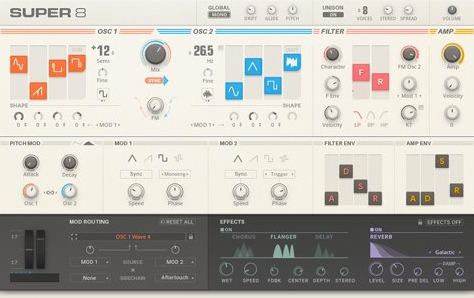Native Instruments launches Super 8, putting classic analogue polysynths into everyone’s hands
New Reaktor instrument puts a modern slant on vintage sounds
The world and its mother might be waiting for Native Instruments to get on and release Massive X, but the Berlin software maven has gone ahead and launched something entirely different. Super 8 is a new virtual instrument that offers “a modern take on vintage polysynth sounds,” and puts the focus on high-quality presets and ease of use.
There are more than 200 stock sounds covering “rich analogue strings, ethereal pads, deep basses, biting leads, electronic percussion, and unusual effects”. These take inspiration from classic analogue synths of the past, but are said to be imbued with their own character, too.

Of course, you’ll want to season these sounds to taste, and what’s where Super 8’s clean and carefully considered interface comes in. Sliders enable you to blend up to four waveforms for each of the two oscillators. You can also mix the oscillators, sync them and add some digital bite via FM oscillation. There are low-pass, band-pass and high-pass filter options, and filter and amp envelopes.
The modulation section, meanwhile, lets you choose one or more mod waveforms and set their speed and phase. You can also map almost any source to any destination.
Unlike Massive X, which will run as a standalone plugin, Super 8 is a Reaktor instrument that runs in both Reaktor 6 and the free Reaktor 6 Player. It’s available now for PC and Mac and costs $69/£59/€69. Find out more on the Native Instruments website.
Want all the hottest music and gear news, reviews, deals, features and more, direct to your inbox? Sign up here.



I’m the Deputy Editor of MusicRadar, having worked on the site since its launch in 2007. I previously spent eight years working on our sister magazine, Computer Music. I’ve been playing the piano, gigging in bands and failing to finish tracks at home for more than 30 years, 24 of which I’ve also spent writing about music and the ever-changing technology used to make it.